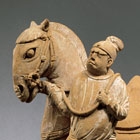J.J. Lally & Co., Oriental Art / New York City, New York
MenuPast Exhibition
Ancient Chinese Tomb Sculpture
March 22 - April 10, 2004
14.
A RED POTTERY GROUP OF A HORSE AND GROOM
Song Dynasty (A.D. 960 – 1279)
the horse with carefully combed long tail and cropped mane, shown equipped with an elaborate bridle and a large saddle over a heavy blanket, standing on a rectangular base with head tucked in restrained by a scowling groom who stands on the same platform base grasping the bridle-strap below the horse’s chin with his right hand and with his left hand holding one of the long reins which he has thrown over his shoulder, the groom well sculpted in a confident attitude, wearing a long tunic over close-fitting pantaloons tied below the knees, and with loosely draped sashes around his waist, a cloth headdress tied onto his head and open sandals on his feet, all modelled from orangey-red pottery showing remains of chalk-white pigment and some encrusted earth, with a small trace of green glaze on the groom’s wrist, the red clay and the informal sculpture style characteristic of tomb sculptures found in Sichuan province.
Height 11 inches (27.9 cm)
Length 9 inches (22.8 cm)
Compare the slightly smaller Yingqing example of this rare model, showing two less elaborately modelled 'foreign' grooms restraining a saddled horse, which was excavated in 1970 at Jingdezhen, Jiangxi province and now is in the Jiangxi Provincial Museum, illustrated in Zhongguo Wenwu Jinghua Dayuan, Taoci Juan (Compendium of Chinese Archaeological Treasures, Ceramics), Hong Kong, 1993, p. 290, no. 404. The same group was illustrated again in Zhongguo Taoci Quanji: Song (The Complete Works of Chinese Ceramics: Song), Vol. 8, Shanghai, 2000, no. 203, p. 220, with description in the back on p. 304, where it is dated to the Northern Song dynasty.
